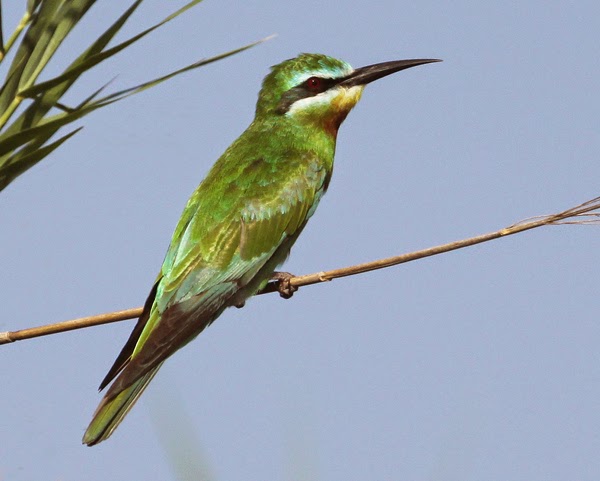However, it would be remiss of us not to record here the recent addition of a new species to the Portuguese avifauna, even if we didn’t actually see the bird ourselves.
Last week there was a very noticeable influx of European Bee-eaters and on Friday, 4th April, we had a phone call to tell us that a Blue-cheeked Bee-eater had been found that morning close to the village of Piçarras, very near to Castro Verde. It’s a species that we have been expecting would turn up here one day and we had even imagined finding one ourselves, perhaps at Castro Marim and probably amongst a newly arrived flock of its common cousins. In the event, it was Daniel Pinheiro who found the bird, apparently with just half a dozen or so Europeans. We were just left with the decision of whether we should make the 260km round trip in an attempt to see it.
Blue-cheeked Bee-eater, Botswana, November 2012
Blue-cheeked Bee-eaters breed in Asia and North Africa and migrate to spend the winter well south of the Sahara. Birds from Morocco and Algeria migrate to West Africa, while those from Asia winter in East and Southern Africa. Like many other long distance migrants, birds returning north in the spring occasionally overshoot and there have been many records in Europe, including Italy, Greece, Spain and even further north in the UK and Sweden. A bird in Portugal was long overdue.We have seen them on numerous occasions in at least seven different African countries and that was our starting point when deciding whether to try and see the bird here. We were also aware that flocks of bee-eaters can be very mobile and suspected that our chances of success might be slim. We also really couldn’t spare the time! So, as with last year’s Caspian Tern in Staffordshire, we quickly decided not to go.
It was good to hear later that those few who did travel got their reward and that after quite a lot of effort the bird was even seen again the following day, not too far from the original location. After that, who knows? Maybe by now it has managed to find its way back to North Africa.
Meanwhile, we are still carefully scrutinising every flock of Bee-eaters that we come across. Surely there’s no reason why there shouldn’t be another Blue-cheeked here somewhere!






No comments:
Post a Comment